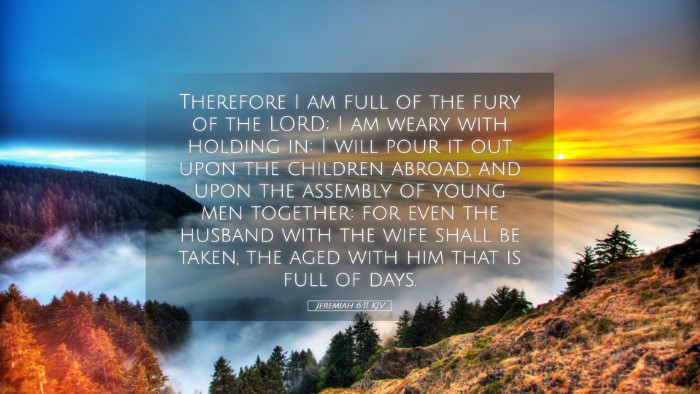Commentary on Jeremiah 6:11
Scripture Reference: Jeremiah 6:11 (KJV) - "Therefore I am full of the fury of the LORD; I am weary with holding in: I will pour it out upon the children abroad, and upon the assembly of young men together."
Introduction
Jeremiah 6:11 expresses a profound despair and divine frustration at the moral and spiritual degradation of Judah. The prophet Jeremiah is often referred to as the "weeping prophet" due to his lamentations over the impending judgment upon God's people. This verse encapsulates the emotional weight of God's message through Jeremiah, revealing both divine wrath and the urgency of prophetic warning.
Contextual Background
The context of this passage lies within a series of warnings delivered by Jeremiah in a time when Israel was experiencing moral decay and impending foreign invasion. The people of Judah had turned away from God and were indulging in various forms of idolatry and immorality. This verse serves as a climax to Jeremiah's prophecies, illustrating the intensity of God's displeasure and the consequences of unrepentant sin.
Analysis of Key Themes
- Divine Fury: The phrase "full of the fury of the LORD" showcases God's intense displeasure with His people. Matthew Henry notes that this fury emanates from a righteous God who cannot overlook sin and injustice.
- Weary of Restraint: Jeremiah expresses a weariness with holding in God's wrath, suggesting a culmination of divine patience being exhausted. Adam Clarke emphasizes that God’s long-suffering was coming to an end, a testament to His justice and righteousness.
- Judgment on the Young: The address to "the children" and "the assembly of young men" signifies that the consequences of sin will be widespread. Albert Barnes draws attention to this, highlighting that judgment will not spare any age group, indicating the pervasive nature of sin within the society.
Theological Implications
This verse carries substantial theological implications regarding God's justice and grace. While the wrath of God is a significant aspect of His character, it is also balanced by His mercy. The stark depiction of divine wrath here serves to remind the faithful of the consequences of sin and the seriousness of divine justice.
The historical context of Jerusalem's fall serves as a warning to future generations about the dangers of turning away from God. Each generation, similar to that of Jeremiah’s time, is called to heed the voice of the prophets and align their lives according to divine will lest they face similar consequences.
Application for Believers
Call to Repentance: For pastors and leaders within the Church, this verse serves as a powerful reminder of the critical need for repentance, both personally and corporately. The accountability of leaders is emphasized in recognizing the spiritual state of the community they shepherd.
Awareness of Consequences: Students and scholars must acknowledge that while God is patient, there are limits to His forbearance. Understanding the consequences of sin encourages a lifestyle of holiness and vigilance in one’s spiritual walk.
Hope in God’s Mercy: Despite the dire warnings, believers are to hold onto God's promises of redemption. In the face of judgment, there is hope for those who turn back to God, reflecting the dual nature of His justice and mercy.
Conclusion
Jeremiah 6:11 stands as a poignant reminder of the seriousness of sin and the swift approach of divine judgment. The exhortation to recognize God's fury should not be taken lightly; instead, it should stir within the hearts of believers a deep desire for renewal, moral integrity, and an earnest commitment to God’s ways. In light of God’s character, we are called not only to embrace His wrath in the face of sin but to rejoice in the opportunity for repentance, as evidenced by the continued prophetic voice urging His people home.


